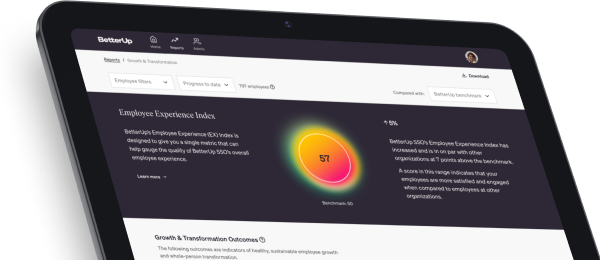-
EN - US
EN - US
-
For Business
For Business
How it works
Platform OverviewTransform your enterprise with the scalable mindsets, skills, & behavior change that drive performance.
IntegrationsExplore how BetterUp connects to your core business systems.
Products
BetterUp LeadBuild leaders that accelerate team performance and engagement.
BetterUp Manage™Unlock performance potential at scale with AI-powered curated growth journeys.
BetterUp Care™Build resilience, well-being and agility to drive performance across your entire enterprise.
Solutions
Sales PerformanceTransform your business, starting with your sales leaders.
ExecutiveUnlock business impact from the top with executive coaching.
Diversity & InclusionFoster a culture of inclusion and belonging.
GovernmentAccelerate the performance and potential of your agencies and employees.
Customers
Case StudiesSee how innovative organizations use BetterUp to build a thriving workforce.
Why BetterUp?Discover how BetterUp measurably impacts key business outcomes for organizations like yours.
- For Individuals
-
Resources
Resources
Library
Guides & ReportsBest practices, research, and tools to fuel individual and business growth.
EventsView on-demand BetterUp events and learn about upcoming live discussions.
Blog
BetterUp BlogThe latest insights and ideas for building a high-performing workplace.
BetterUp Briefing
BetterUp BriefingThe online magazine that helps you understand tomorrow's workforce trends, today.
Research
BetterUp LabsInnovative research featured in peer-reviewed journals, press, and more.
- About

- Mandated RTO plans are driving higher employee attrition than expected
- However, manager coaches have teams that are thriving back in the workplace
- Employees mandated to RTO with manager coaches are 30% less likely to express interest in changing jobs and 31% less burned out
For the last three years around Labor Day, the return to office (RTO) debate has emerged as reliably as the turning of the leaves. In 2021 amidst the surging Delta coronavirus variant, employers pushed employees to return to the office at least some of the time. Last fall, major tech players announced big plans to bring their people back onsite full-time.
This year seems to be no different, however shifts in employee desires may be signaling an even bumpier road than previously. In one new survey, upwards of 80% of bosses regret their initial return-to-office decisions and say they would have approached their plans differently if they had a better understanding of what their employees wanted.
RTO may be one of the biggest (and trickier) operational and talent challenges right now. Three recent studies confirm this:
Articles in this issue
However, not everyone is struggling with the return to the workplace. There’s a cohort of employees across different industries and demographics who aren’t just begrudgingly returning onsite — they’re thriving and finding plenty of support from their managers.
The study
We surveyed 1,012 full-time US-based workers who have experienced a significant increase in time spent in the office in the last 12 months. Roughly two-thirds of these respondents (n=711) returned to the office (RTO) due to a mandate from their organization’s leadership; the remaining respondents in this sample returned to the office due to expectations from leadership (but did not have a mandate) or a personal preferences (n= 301). We wanted to better understand what impact their managers have on their preferences to return to the office, but also leadership approaches that helped during this time of transition.
The results
Employees returning to the office who perceived their leaders as “manager coaches” had better outcomes across the board, from lower turnover and retention to higher engagement and more organizational commitment.
What is a “manager coach?”
Manager coaches don’t just have management skills; they have coaching skills. These skills show up in how they lead, help teams overcome challenges, and provide support and guidance for their people.
Manager coaches approach communication and relationships where questions are asked instead of answers provided, support is offered without judgment, and development is facilitated rather than dictated or commanded.
Other coaching behaviors for managers include:
- Guiding direct reports on specific ways they can individually learn and grow
- Asking their team questions that lead them to personal insights
- Helping their team set goals related to their job performance
- Making introductions to help broaden the range of opportunities for their team members
- Presenting new projects or tasks to the team as learning opportunities
- Using thoughtful questions to help team members solve problems
- Encouraging their team to reflect on their strengths and weaknesses for self-awareness and future performance
Managers who take a coaching approach help people adapt and grow, driving peak individual performance and higher team and organizational outcomes. They scout opportunities for “coachable moments” to serve the individual and the organization. They use team coaching to accelerate social learning and alignment.
While snacks, free lunches, or even threats won’t get people to return to the office, developing managers into coaches will.
Manager coaches make or break RTO
Helping your frontline leaders boost their coaching skills has a direct impact across a variety of metrics that are vital for RTO success. Our survey found:
Overcoming the challenges of RTO
The return to office has proven to be a tricky initiative to get right. Recent polling confirms this, with most bosses saying they regret mandating employees back into the workplace. Nearly a quarter of leaders admit to making decisions based on “gut instinct,” and 57% say that if they had better access to data, they could better measure the success of their in-office policies.
Our survey data paints a clear picture—building a workforce of frontline manager coaches takes the guesswork and regret out of your RTO plans.
ABOUT THE CONTRIBUTORS





-2.jpg)
-2.jpg)
-2.jpg)
-2.jpg)
-2.jpg)
-2.jpg)
-2.jpg)


